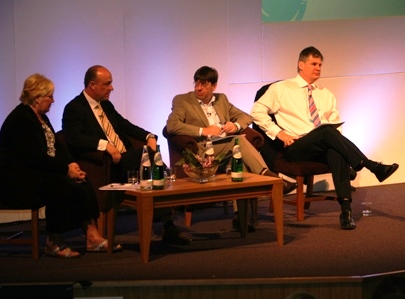
The expert panel debate the future of Scottish sport
Debating the future: the Scottish Sports Development Seminar 2009
The Leisure Review is a natural partner to the Scottish Sports Development Conference. We’re both fiercely independent, committed to the sector we serve and fond of a “rer terr” given the opportunity. So it was no surprise to find Mick Owen making the long journey north to find out what was afoot in Aviemore.

The expert panel debate the future of Scottish sport
The Scottish Sports Development Conference is a wee gem of a thing. It is delivered by a volunteer organising group, it attracts the highest profile speakers, it is planned using detailed feedback from the audience it is designed for and it attracts committed sport and leisure professionals who come to work hard, learn lots and contribute where required. No professional body in our sector comes close to matching it for relevance, energy and independent support and the fact that for the fifth year in a row Stewart Harris, chief executive of SportScotland, not only spoke but stayed for all of both days and contributed to the debate throughout is evidence of the high regard in which it is rightly held.
And debate was the theme, with former delegates and industry professionals asking for the chance to really talk to each other, not just be talked at. Calling an event Sports Development – Debating the Future is one thing but giving over almost all of the first day to discussion groups of one dimension or another is a brave move. The organisers’ hopes for success from their risky strategy were boosted immeasurably when the sports minister was ‘reshuffled’ and someone offered Margo MacDonald MSP in his stead. In her youth Ms MacDonald was a political firebrand, representing the Scottish National Party in Westminster and forcing a referendum on Scottish devolution nearly 25 years before it actually happened. Nowadays she chairs the cross-party group on sport in the Holyrood parliament and her word carries huge weight. So when she told delegates that the conclusions from their debate would go straight to the cross-party group and thence to the sports minister – without editing – she really raised the stakes.
Before she did this, however, the convener of the organising group, Liza Baillie from Scottish Squash, had welcomed everyone to the conference and devolved the job of day one chair to John Beattie, former rugby internationalist and current controversialist. Beattie has presented at the conference three times and like Stewart Harris values its vibrant contribution to the Scottish sporting landscape. He is an iconoclast who brooks no fence-sitting and is as happy demanding answers from timid audience members as he is challenging agency chief executives. But even he gave best to Margo MacDonald. Seemingly a ‘frail wee woman’ who would be happier at home with her knitting and a tape of “hieland airs” she is as sharp as ever when riled. She merrily aimed barbs at politicians “the last ones standing when they picked the rounders teams”, PE experts who failed to get kids to “take their shoes and socks off and get doing something”, Rangers Football Club, who constantly lobby her while beating her beloved Hibernian, and Baron Sebastian Coe.
But lobbying, or “nagging”, is her modus operandi and she demanded ammunition from the conference. “I will be entrusted with taking your deliberations,” she told the room, “and nagging the Scottish parliament” but “you are charged with coming up with ideas; and often there is a paucity of ideas”. For a correspondent with over a decade of sports development seminars under his belt it was heady stuff and although the cross-party group “doesn’t make policy” its chair explained that “it can get to the people that do”. She also promised: “I have no party.” She is the only independent in the Scottish parliament “so I can concentrate on the matter in hand – your document.” Brendan Dick of BT Scotland was on a hiding to nothing and although he offered some surprising statistics – one BT person dies of heart disease every two weeks, for example – his message that “businesses are less into giving money to sport but far more interested in contributing human time and human expertise” rang slightly hollow two days later when his conglomerate announced 15,000 job cuts worldwide.
Following the two presentations, there was the first of the day’s debates with MacDonald, Dick and Harris responding to prompts from the floor and from Beattie. It became clear to this incomer that the biggest stumbling block to the development of sport in Scotland is the lack of legislation to politicise the targeting of sport, especially at local authority level. MacDonald clearly feels the blame lies with civil servants, although Harris reflected that sport should “be consistent with our message to politicians”. If Harris has a bee in his bonnet it is about the school estate whose planners and managers are hampering the development of “a school/club culture built around accessible and affordable school facilities”. Many agreed with him and despite the chair’s best efforts the session seldom left the vexed question of schools; how they teach, how their facilities are used and how they are managed for community benefit.
The next part of the programme was the most crucial and the most risky of the entire conference. It involved six groups each discussing a single issue identified in advance by the organising group. People were allocated a group and therefore an issue. Would the delegates stand for it? Would they contribute? Would the debate last the time allowed – or run over? Would any substantive response result? At twenty minutes in there was little energy in any of the rooms and chair Beattie, as nervous as an expectant father in the corridors outside the debating rooms, was clearly worried. He needn’t have been. By the time the sessions finished the zing was tangible. People had been thoughtful, challenging and above all concerned to get it right; and the facilitators had the lunch hour to get it on celluloid ready for the afternoon.
To develop rather than just revisit the morning’s deliberations the organising group had invited representatives of eight ‘constituencies’ to take to the stage and somehow filter the greater debate through their perspectives. They weren’t sure it would work. Beattie, again taking charge, wasn’t sure how it was to work. But it did. The eight people on stage offered apposite, concerned comments, Beattie amused himself with rugby-related energisers and the debate moved forwards. Stew Fowlie from Scottish Universities Sport, speaking in the section on the lack of clarity in the system, said there are “too many cooks” and argued that “lively, local, appropriate debate among all the stakeholders” is critical to moving forwards. His claim was echoed in the debate of leadership when, from the floor, Audrey White of Dundee criticised “tick-box” accreditation schemes which provided neither leadership nor clarity for clubs. And when it came to clubs Malcolm Gillies, representing clubs, argued for altruism rather than parochialism and even had the temerity to suggest in the debate on funding, and the lack thereof, that clubs could help sports development professionals achieve their ends – if they were to ask. Heady stuff and the debate ranged far, wide and fast with the chair always prepared to challenge idle thinking and shrinking violets.
For your correspondent two things stood out: the panel’s ability under the stress of an uncomfortable context and a fast-moving debate to make telling and crafted responses; and the simple cry from the morning’s discussion group on medals versus participation. We need, they said, “a cultural shift to positive”.
Day two followed a more standard conference pathway with short briefings aimed at rousing the delegates followed by CPD workshops, lunch and the final keynotes. Conference organisers will bemoan the tendency of delegates to rush off before an event ends but First City Events, who manage this event fantastically well, seemed to hit on a winning, if unlikely, formula. The afternoon combined Richard Moore, a journalist and novelist who knows Chris Hoy, and David Florence, an Olympic medallist who knows his own mind. Neither is a ‘motivational speaker’ but both brought inspiration to the table. Moore’s scruffy, if ironic, self-promotion and association with others’ achievements made key points about elite sport and counter-pointed nicely with Florence’s elegant but modest exposition of his own genuine excellence. It seems that David and his brother were seen as teenagers by an England squad coach whose verdict was: “It’s a shame they took up the sport too late to be successful as they have potential.” Florence doesn’t answer to any coach these days. He sets his own goals, plans his own programmes and carries his silver medal around with him to prove his point; and humour the likes of us.
And after a quick Q&A the focus went from one quietly successful person to another. It fell to Liza Baillie to feed back the headlines of the conference report that could, and some would say should, change the face of sports development in Scotland. This she did. Eloquently, passionately but with a diffidence born of a genuine concern. Would the delegates accept that the words on the screen truly represented the debates they had been party to? As Derrida said, “Every decoding is another encoding” and things get lost in the interpretation. Had the organising group gone too far in trying to precis the debate and summarised the intent into a siding? Apparently not. The six points were revealed and explained and when Liza asked the conference to “stand up for sport” and support the report they all did; and they all applauded.
The Leisure Review, June 2009
© Copyright of all material on this site is retained by The Leisure Review or the individual contributors where stated. Contact The Leisure Review for details.
Stand up for sport: those findings in full
1 Clarity of roles and responsibilities
The conference identified a ‘loss’ of the strategic aims of the Reaching Higher document between the strategists and the front line. There is a collective responsibility to recommunicate and reacquaint with these aims.
2 Integration and communication
We need to build and use local frameworks that include all the players.
3 Access to facilities/schools
The sporting community should be influencing the planning, programming and pricing of facilities in the schools estate. Examples of good practice are required where both access and affordability have been adressed.
4 Raise the profile and value of sport
We require a culture shift to positive; not just for sport's sake but for our communities.
5 Funding
Too much funding is short-term. We want a long-term approach to long-term funding and a co-ordinated communication of opportunity.
6 Local club development partnerships
This aim requires points 1 and 2 to happen plus political support, an end to duplication and above all dependable and consistent access to facilities.
“We are not an authority – we are volunteers – but we feel the voice of the profession is something that should be taken forward.”
Liza Baillie, convenor, Scottish Sports Development Conference 2009
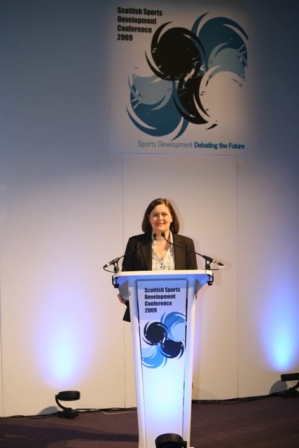
Liza Bailley opens the event
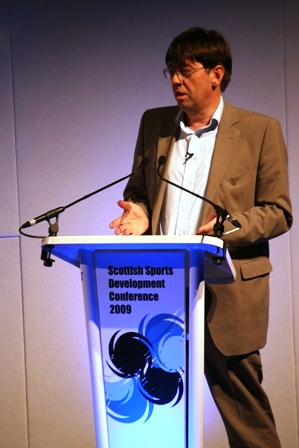
Brendan Dick, director of BT Scotland
SSDC Conference
Organising Group
Liza Baillie Scottish Squash (convener)
Jim Blythe Renfrewshire Council
Iain Campbell
SportScotland
Elanor Cormack Sport Tayside & Fife
Ben Glencross
Scottish Hockey
Gillian Jones Edinburgh Leisure
Penny Lochhead
PMR Leisure
Bob McGonigle Scottish
Sports
Association
Willie Young Argyll & Bute Council
Stuart Younie
Perth & Kinross Council
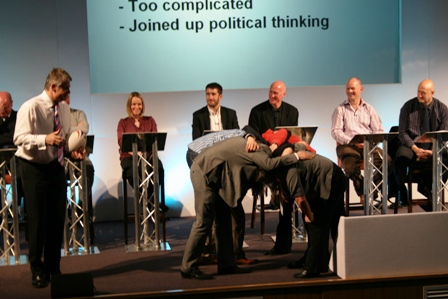
Scrummaging to prove a point: it's the Scottish way
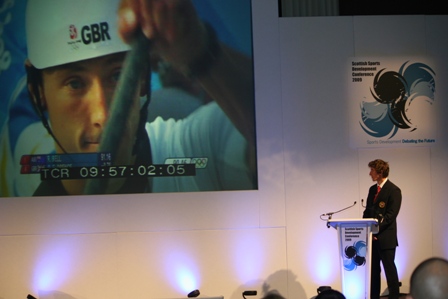
David Florence talks fast water